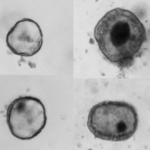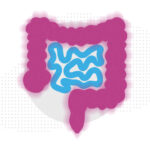Genetic causes of congenital diarrhea and enteropathy come into focus

Congenital diarrheas and enteropathies are rare and devastating for infants and children. Treatments have consisted mainly of fluid and nutritional management. But in recent years, targeted dietary and drug therapies have emerged based on genetic discoveries. Now, research led by Boston Children’s Hospital, The Hospital for Sick Children in Toronto, and UCLA takes a major step toward genetically guided care for these conditions.
In the first multicenter effort of its kind, the team analyzed next-generation sequencing data from PediCODE, a consortium of medical centers investigating early-onset diarrheal disease and intestinal failure. In all, they studied 139 infants with chronic diarrhea not related to infection or allergy who were suspected to have single-gene disorders, as well as 182 parents and siblings. Their findings appear in The New England Journal of Medicine.
Exome sequencing found diagnoses for most of the infants. However, three required whole genome sequencing or targeted Sanger sequencing to find a genetic cause. Overall, half of the 139 infants had causative variants in one of the 25 known genes. Eight genes explained about 75 percent of these diagnoses: EPCAM, MYO5B, SKIV2L, TTC7A, SLC9A3, DGAT1, XIAP, and NEUROG3.
In addition, the team identified three previously unknown causative genes — GRWD1, MYO1A, and MON1A — and delineated their function in cell and zebrafish models.
“Hopefully these will be added to the list of genes that we look for in gene panels for diarrhea,” says Jay Thiagarajah, MD, PhD, co-director of the Congenital Enteropathy Program at Boston Children’s and co-senior investigator on the study.
Precision medicine for diarrhea and enteropathy?
Genetic variants can interfere with intestinal function by disrupting a variety of physiologic processes. Examples include epithelial transport of nutrients or electrolytes, enzyme function and metabolism, cell trafficking, endocrine cell function, and immune regulation. The discovery of GRWD1 deficiency adds defective ribosomal biogenesis and intestinal goblet cell dysfunction to the list of causes. MON1A appears to disrupt trafficking of vesicles in intestinal cells, while MYO1A appears to disrupt microvilli at the brush border.
Thiagarajah’s team is starting to use genetic findings to change treatment of early-onset diarrhea and enteropathy. His lab recently studied MYO5B, a gene related to MYO1A that has been linked to microvillus inclusion disease. Modeling MYO5B mutations in intestinal organoids, his team identified two promising treatment approaches. One of them is now in a clinical trial.
In 2024, Thiagarajah and the Congenital Enteropathy Program evaluated a 10-year-old boy who had persistent diarrhea, malabsorption, and poor growth since infancy.
“He’d been going from place to place to figure out what was going on,” Thiagarajah says.
Genomic sequencing transforms a life
Asa Cibelli, 11, feels like he’s been reborn. Learn how his genetic diagnosis led to a complete reversal of his unrelenting abdominal pain and diarrhea.
Genome sequencing revealed a very rare mutation in the SLC10A2 gene, the sixth-known case in the world. The mutation, causing a loss of function of a bile-acid transporter in the intestine, had a surprisingly simple fix: Cholestyramine, a drug that soaks up excessive bile acids in the intestine, eliminated this patient’s diarrhea and transformed his quality of life almost immediately.
Based on the study findings and his own experience, Thiagarajah would like to see the eight most commonly implicated enteropathy genes added to newborn screening protocols. “While some of these genes don’t point to a defined treatment, there are huge benefits if you can diagnose these conditions early and manage them properly,” he says.
Katlynn Buda Gwilt, PhD, of Boston Children’s was a co-first author on the paper.
Learn more about the Congenital Enteropathy Program at Boston Children’s.
Related Posts :
-

Microvillus inclusion disease: From organoids to new treatments
Microvillus inclusion disease (MVID) is a rare type of congenital enteropathy in infants that causes devastating diarrhea and an inability ...
-

A perfect genetic hit: New gene mutation implicated in rare congenital diarrhea
When the 1-year-old boy arrived from overseas, he was relying on total parenteral nutrition — a way of bypassing the digestive ...
-

A journey through the intestine during colitis, cell by cell
Inflammatory bowel disease (IBD), causing devastating abdominal pain, persistent diarrhea, and rectal bleeding, is hard to control with current treatments. ...
-

A new approach to C. diff? Targeting the inflammation, not the bacteria
Clostridium difficile (C. diff) intestinal infections can cause severe, debilitating diarrhea in patients who are hospitalized or on immunosuppressive therapies. ...




